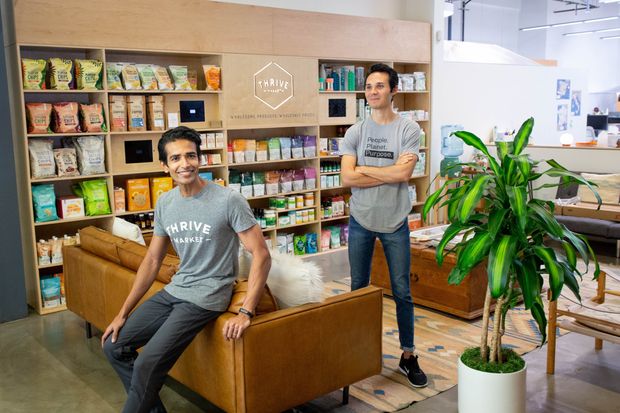Or listen in your favorite podcast app
Apple Podcasts / Google Podcasts / Spotify
If you ask Sasha Siddhartha, there are three core barriers that have prevented consumers from living a healthier lifestyle: price, geography, and information. Now, as the co-founder and CTO of Thrive Market, Sasha is working to eliminate those barriers in order to provide consumers with healthier options, all at the click of a mouse. On this episode of IT Visionaries, Sasha discusses the role Thrive Market plays in assisting consumers on their personal health journey and why the grocery industry is making big strides in eCommerce.
Main Takeaways
- Think Big, But Also Small: Big companies offer tremendous opportunity to learn how to build for scale, high commitment to quality, and rigorous repeatable processes, which are all things that can be undervalued with start-ups. Take advantage of the knowledge available to you about what made those companies successful and then tweak it to fit your business.
- It’s In the Details…Kind of: When you are building a company from the ground up, you can’t be focused on one particular function. Instead, focus on the big picture. Don’t get bogged down with minute details. You have to constantly be thinking about what is on the horizon.
- We’re The Three Best Friends: Finding the right business partner is key to any company’s success. When you’re scouting individuals to go to work with, make sure they know the industry well and make sure they are someone you want to battle with through the good times and the bad times.
—-
If you ask Sasha Siddhartha, there are three core barriers that have prevented consumers from living a healthier lifestyle: price, geography, and information. Now, as the co-founder and CTO of Thrive Market, Sasha is working to eliminate those barriers in order to provide consumers with healthier options, all at the click of a mouse. On this episode of IT Visionaries, Sasha discusses the role Thrive Market plays in assisting consumers on their personal health journey and why the grocery industry is making big strides in eCommerce.
Growing up, Siddhartha loved video games. Anything from consoles to hand-held devices captured his attention and his imagination. Even still, he didn’t have plans to pursue a career in technology. Instead, it was a conversation with a family member that steered him down his current path.
“At some point along the way, my uncle kind of needled me a little bit and said, ‘Why don’t you get up one of these days and actually build one of these instead of just consuming the content?’” Siddhartha said.
So he did. After graduating from Stanford and embracing the start-up lifestyle, Siddhartha met his soon-to-be co-founders of Thrive Market, and embarked on a mission that fit exactly what he was looking for in the tech space.
“I love the creative aspect of software engineering and the ability to get out there and build things that added real value, utility and joy to people’s lives,” Siddhartha said.
Today, Sasha is the CTO and Co-Founder of Thrive Market, a mid-size eCommerce grocery that works to make healthy living easy and accessible for everyone, regardless of location. As the CTO, Siddhartha works to unify Thrive’s business strategy and connect it with a cohesive digital product that allows the consumer to operate efficiently and effectively while securing the proper items. But it wasn’t always simple, and in fact, there were lots of bumps along the way.
Prior to helping get Thrive Market off the ground, Siddhartha worked for Microsoft as a development lead. And going from a well-run and well-established company to the blank slate of starting your own business was a tough learning curve.
“Big companies can be an awesome training ground for anyone who wants to go lead technology from the inception of a business,” he said. “It really instills the right best practices when it comes to building for scale, high commitment to quality, rigorous repeatable process, which are all things I think are undervalued at startups.”
Siddhartha also mentioned that when you go from working at large-scale companies, one of the biggest challenges he faced while learning how to build a business from the ground-up was focusing on the big picture and not just a particular function of a project.
“You come down to a world where you have to start thinking about everything, versus just thinking about your function,” Siddhartha said. “When you’re at a big company, in whatever role you have, you’re on a path. You come in, you have a routine. You’ve got expectations. Your workdays are well-organized just by virtue of being in that environment. When you’re employee number one you really have to drive yourself and you figure out what’s your pace? What are you going to focus on next? You have a much higher sense of ownership.”
One last piece of advice Siddhartha stressed when looking to build a company from scratch: find the right people to work with and make sure they have the same sense of ownership in the product that you do.
“Be as strategic as possible and make sure that the focus is on partnering up with folks who are experienced entrepreneurs and have seen success,” he said. “Make sure they know what they are doing in the space, and ultimately a lot of it comes down to the human dynamic and your ability to feel like these are the right people to be with doing good times, but also during bad times.”
So how does Thrive Market succeed amongst health-conscious big-box grocery stores like Whole Foods and Trader Joe’s? If you ask Siddhartha, they aren’t competing with them. Instead, as Thrive Market approaches nearly one million users, they are going head-to-head with the more traditional grocery provider.
According to Siddhartha, traditional health food grocers have only been accessible to the top 3-5% of the population, when it comes to disposable income. When it comes to price, Thrive sees its role as bringing the healthier, organic, and less-produced options to consumers at a comparable price to conventional grocers.
“Historically natural, organic products have sold at a premium compared to conventional more-processed equivalents,” he said. “It makes no sense that a product that have less ingredients and involves less manipulation of the product is actually more expensive to bring to market.”
Siddhartha argues that this is part of the problem. Because of grocery mark-ups on a healthy lifestyle, many consumers simply cannot afford healthy food options. Siddhartha feels strongly that their role as a provider and grocer is to be a trusted partner in a consumer’s journey to a better lifestyle.
“This boils down to the curation of the website, so they can shop by over 150 diets, offer carbon-neutral shipping so they can feel good about the purchases they are making, and the last part is by layering in value-added content and educational information to help inform their customers about the choices they are making,” Siddhartha said.
Thrive Market deploys a membership-based model, where users pay an initial sign-up fee for the year, providing them with access to their favorite organic and non-GMO brands. It’s a model similar to the one used by Costco, where members save on items over the course of multiple purchases. Siddhartha said after your second purchase, the membership typically pays for itself.
Siddhartha closed the conversation with one final sales pitch: Next time you’re frustrated with an overwhelming selection of goods at your local grocer, check out Thrive Market to see if the process is any simpler.





